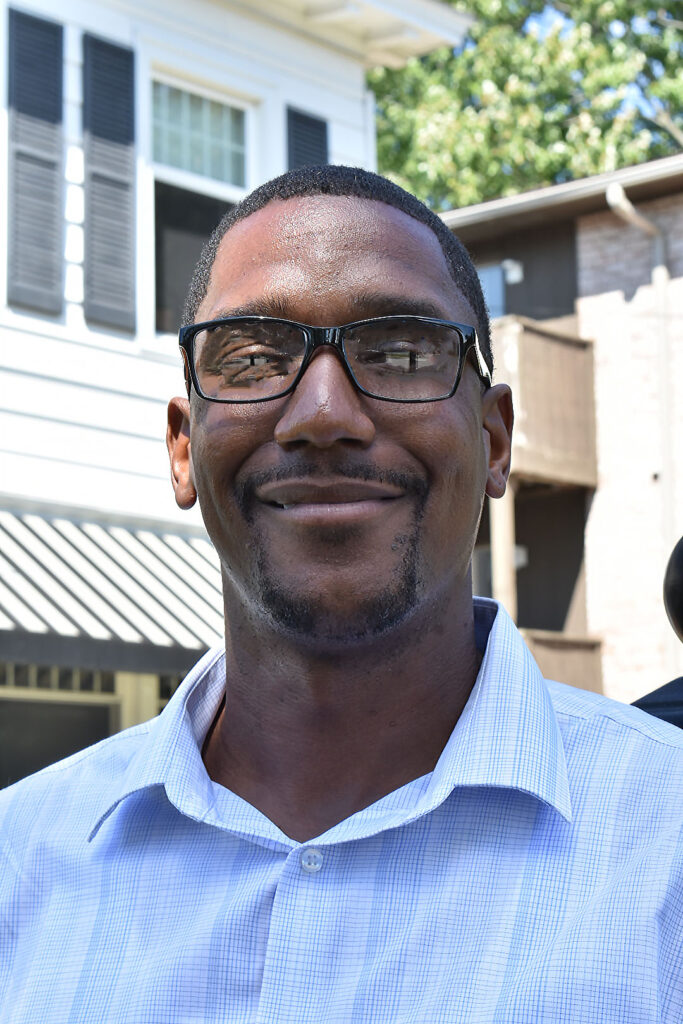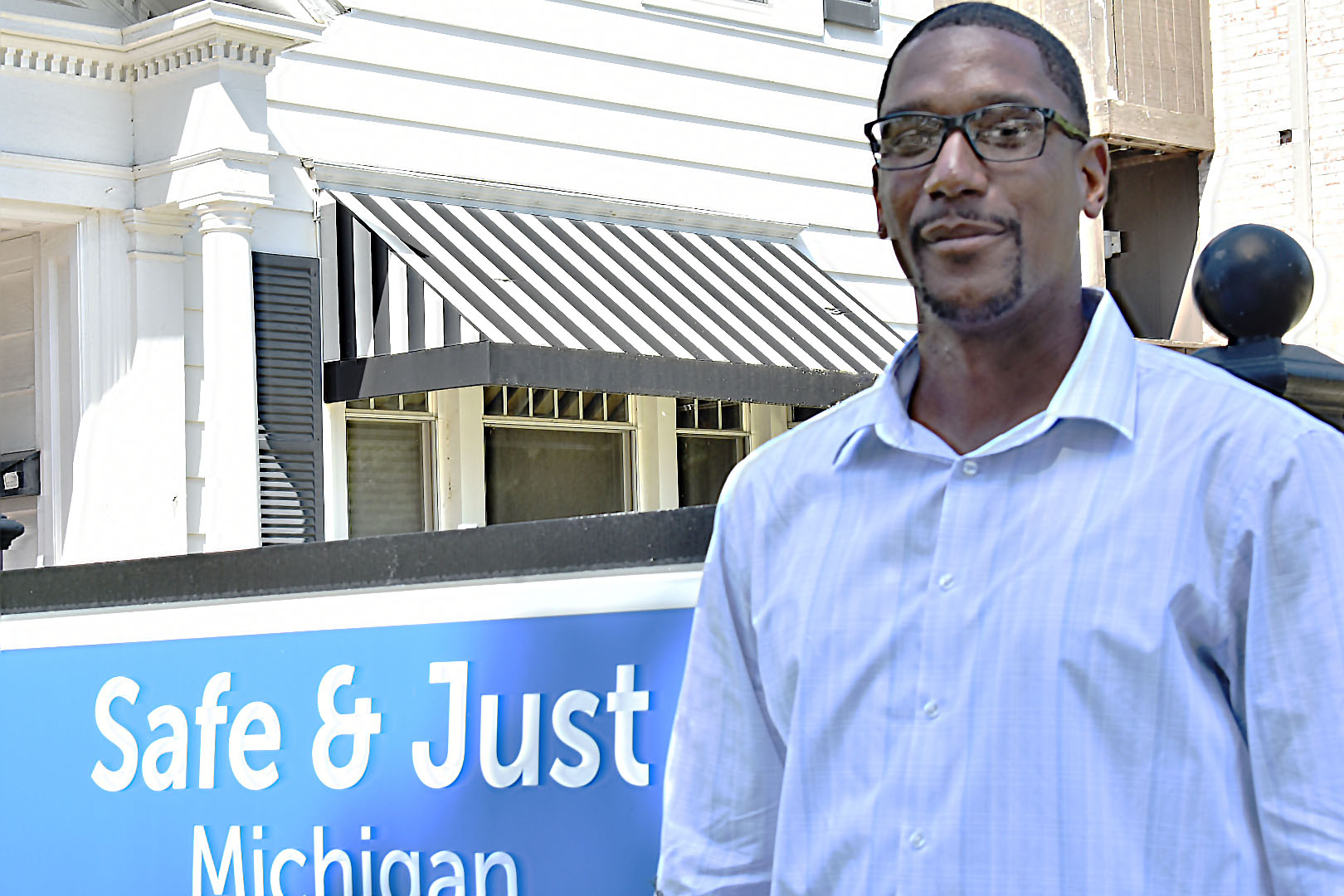In his 40 years, Tamir Bell has been a motherless child, a star pupil, a drug dealer, incarcerated and a community activist. But to truly understand him, you must look beyond all those labels.
“It’s a very dangerous thing to try to understand people,” says Tamir, who is now one of two development fellows at Safe & Just Michigan. “I’m not the exception to the rule and I’m not the rule. Don’t pigeonhole people by the stories you’ve heard.”
Still, the stories of Tamir’s life can help you understand who he is, and why he is so passionate about working for criminal justice reform today.
Tamir was born in Detroit but spent his early childhood in California and Alabama. His mother raised him and his two older siblings — a brother and a sister — “and did a good job of it,” he said. His father was incarcerated while Tamir was a young boy, but his mother made sure Tamir maintained a relationship with him. Expectations were set high for Tamir, and his mother was a strict disciplinarian. That suited Tamir well, and he thrived in that environment. But when his mother became sick with cancer, his world crumbled.
He was just 12 years old when he watched his mother die on the living room floor while his sister frantically tried to revive her. Tamir and his siblings returned to Detroit, where they were each sent to a different relative’s home. Tamir lived with his grandparents, whose parenting style was indulgent compared to his mother’s strict standards.
When his grandparents wanted him to attend the Cass Tech magnet school, he complied — even though he didn’t enjoy the hour-plus bus ride to and from school. Tamir maintained an impressive A- grade-point average for two years, but then the long commute wore on him. He opted to leave Cass Tech for his local high school, and that’s when he started to struggle. Partly, he said, it was that expectations were lower in his new school. As a teen, he didn’t see a need to exceed them.
In the end, Tamir made it through his senior year — but he didn’t get a diploma. He skipped too many school days to get the piece of paper, and school administrators said he’d have to return for summer school. Instead, he dropped out.
“The worst decision in my life was dropping out,” Tamir said. “I didn’t realize I could have just taken a test and gotten a GED. Had I known that, I would have done it as soon as I left Cass Tech. Everything could have been different.”
Instead, Tamir began hanging out with people that he felt were in his best interest. They weren’t. When his grandparents objected, he moved out onto the street. Finding a job without a diploma was an impossible task, so he began selling drugs to support himself.
“I had transformed from being a student-athlete to running the streets, selling drugs and partying,” he said.
It all caught up with him eventually. When he heard there was a warrant for his arrest, Tamir went underground and evaded law enforcement for six years. It may have gone on longer if he hadn’t got a toothache. Desperate for a root canal, he took his brother’s driver’s license and insurance card and went to see a dentist.
His brother, Terrel, was both a Marine and a Detroit police officer at the time. It became clear that fraud had been done in Terrel’s name. Though Terrell had done nothing wrong, he was arrested and jailed. Prosecutors wanted to pressure him to turn on Tamir — or to pressure Tamir into turning himself in
Tamir was eventually convicted and sentenced in 2007, but he had been charged under a 2001 law that was no longer on the books by then. That 2001 law was far harsher than the one that replaced it, and it landed him in prison on two 12-year sentences to be served consecutively — a total of 24 years and up to 46 years for a first-time, nonviolent offense.
“I just remember feeling it was unbelievable,” Tamir said.
There was, however, a silver lining. Because he was convicted under a law that had been partially retroactive, he would be allowed to have a parole hearing after the first of the 12-year sentences was over. That became his goalpost, and he put all his energy into coming home early.
Some parts of working toward that goal were relatively easy. Getting a GED was simply a matter of taking a test — he had been prepared for that for years. He enjoyed taking classes and completed nearly 50 hours of college credits toward an Associate of Business degree from Jackson Community College. He also discovered he loved teaching, and he volunteered to tutor and mentor others inside prison.
Other parts of prison life were far more difficult. He never got used to the routine violence all around him. Sometimes he saw it inflicted on others, and sometimes it was inflicted on himself.
 Through it all, Tamir maintained his composure. “I’m blessed with the ability to appear calm in chaos,” he said. “That was a good thing during the parole hearing when they were saying things to try and rattle me on purpose.”
Through it all, Tamir maintained his composure. “I’m blessed with the ability to appear calm in chaos,” he said. “That was a good thing during the parole hearing when they were saying things to try and rattle me on purpose.”
Tamir figures it was his ability to remain cool and his record of learning and mentoring others that convinced the parole board to let him go home after 12 years. He was released on Feb. 25, 2020, about two weeks before the state shut down for COVID-19.
In those few days, he managed to get his driver’s license. That enabled him to start up Legacy Transformation Transportation, a countrywide freight hauling business, with his cousin. He also found work as a landscaper.
That wasn’t enough for Tamir, who wanted to become politically active as well. Since 2020 was an election year, he began to work with Michigan Liberation, whose goal is to end mass incarceration. Tamir deeply wants to help the formerly incarcerated. “I want to be one of the one or two people to have other people’s backs when they come home,” he said. “I try to be as helpful as possible for the men who come home and the ones I left behind.”
Tamir acknowledges that his sister, Torri, helps make this possible. Not only did she take him in when he left prison, but she made sure he had a car to use as well. Her reasoning? As Tamir explained: “She made sure I had a place to stay and a vehicle, because without those things, I’d be going back on the street.”
Most importantly to Tamir, he now gets to live with his son, Jamir, who recently graduated from high school and is interested in learning a skilled trade. Tamir recently enrolled in the SOAR program for nontraditional students at the University of Michigan-Dearborn. It’s important for Tamir to “set the example” for Jamir by earning a degree.
That’s a lot to put on any plate, but Tamir was ready for more. When he learned Safe & Just Michigan was looking for people for a development fellow, he jumped at the chance. “Fundraising and grant writing would be beneficial to my community — the community of Detroit and the community of returning citizens.”
He would like to start a community center that blends youth mentoring, recreation and athletic activities to promote mental health, education and to meet the needs of youth in his community. All these things require funding, and he hopes to learn those skills during his time with Safe & Just Michigan.
“The most effective avenue in changing this system that produces mass incarceration of so many Black and Brown people is preventative — it’s early childhood education and activities specifically for young men,” he said. “That’s what I’d love to do. I want to help.”
At Safe & Just Michigan, Tamir will be working with Development Director Amy Smitter to learn about fundraising and grant writing for nonprofits. The fellows program aims to prepare justice-involved people with the tools they need to achieve their own goals for their communities. Safe & Just Michigan believes everyone, including formerly incarcerated people, deserves second chances, and that society benefits when people coming home from prison are empowered to succeed.

